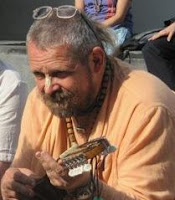WORLD DAY FOR LABORATORY
ANIMALS CELEBRATED YESTERDAY
 Agencies - AAshley Owen of Animal Aid says that the World Day for Animals in Laboratories is not recognised by the UN. Ironically, it does recognise World Malaria Day – a disease that benefits from animal research. Owen claims that 3.5 million animals are "subjected to experiments", yet nearly half of these are the birth of a laboratory mouse. Only 2% of experiments involve substantial suffering. Thousands of primates are poisoned to death every year inside British laboratories and hundreds more are subjected to appalling brain experiments. The Europe-wide campaign to end primate experiments has united animal protection groups as well as compassionate MPs and scientists across the continent. On the other hand, a Letter signed by celebrities was handed into the Prime Minister at 10 Downing Street on Wednesday (24 April) – World Day for Laboratory Animals.
Agencies - AAshley Owen of Animal Aid says that the World Day for Animals in Laboratories is not recognised by the UN. Ironically, it does recognise World Malaria Day – a disease that benefits from animal research. Owen claims that 3.5 million animals are "subjected to experiments", yet nearly half of these are the birth of a laboratory mouse. Only 2% of experiments involve substantial suffering. Thousands of primates are poisoned to death every year inside British laboratories and hundreds more are subjected to appalling brain experiments. The Europe-wide campaign to end primate experiments has united animal protection groups as well as compassionate MPs and scientists across the continent. On the other hand, a Letter signed by celebrities was handed into the Prime Minister at 10 Downing Street on Wednesday (24 April) – World Day for Laboratory Animals. The petition is calling for less secrecy about what happens to animals in laboratories. Jan Creamer, who runs the National Anti-Vivisection Society, says the Government is thinking about changing the law so that everybody can know exactly what happens to animals in experiments. She says it will enable people to look at other ways to replace animals in all experiments, as has happened with cosmetics testing recently. At the moment, animals are still used in tests for medical treatments.
The petition is calling for less secrecy about what happens to animals in laboratories. Jan Creamer, who runs the National Anti-Vivisection Society, says the Government is thinking about changing the law so that everybody can know exactly what happens to animals in experiments. She says it will enable people to look at other ways to replace animals in all experiments, as has happened with cosmetics testing recently. At the moment, animals are still used in tests for medical treatments. On World Animal Day, Jan says: “Following the huge success of the end to animal testing for cosmetics in Europe, the National Anti-Vivisection Society (NAVS) is asking people to make sure their household products are cruelty free – look on our website.” Jan also wants people to get involved in Government ideas about freedom of information on animal experiments.
WHAT DO THE VEDIC TEACHINGS TELL US?
 When you observe the problem of unconscious consumption, some measures must be taken. That's the way how the conscious consumer arises. Consider some characteristics of this ethical, healthy and ecological position. First of all, the conscious consumer avoid all products having to do with the killing of animals, including food, fashion (costumes made of fur), vanity (many laboratories experiment with thousands of animals in order to produce cosmetics and toiletries), fun (we have enough news about the shows where ridicule and torture creatures), customs and traditions (such as hunting, a bloody pastime, etc.). The conscious consumer does not use items that have been produced under the agony and exploitation of other beings.
When you observe the problem of unconscious consumption, some measures must be taken. That's the way how the conscious consumer arises. Consider some characteristics of this ethical, healthy and ecological position. First of all, the conscious consumer avoid all products having to do with the killing of animals, including food, fashion (costumes made of fur), vanity (many laboratories experiment with thousands of animals in order to produce cosmetics and toiletries), fun (we have enough news about the shows where ridicule and torture creatures), customs and traditions (such as hunting, a bloody pastime, etc.). The conscious consumer does not use items that have been produced under the agony and exploitation of other beings.
Śrīla Bhakti Aloka Paramadvaiti Mahārāja :
“Conscious Consumers” - “Vedic Wisdom Collection”
http://www.vedic-wisdom.org/
http://vedicwisdom.weebly.com/
http://www.sabiduriavedica.org/sv.php?id=110_81
“Conscious Consumers” - “Vedic Wisdom Collection”
http://www.vedic-wisdom.org/
http://vedicwisdom.weebly.com/
http://www.sabiduriavedica.org/sv.php?id=110_81
Published by dasavatara das - "Vedic Views on World News"
http://www.vedicviews-worldnews.blogspot.com.ar/
http://www.vedicviews-worldnews.blogspot.com.ar/

No comments:
Post a Comment